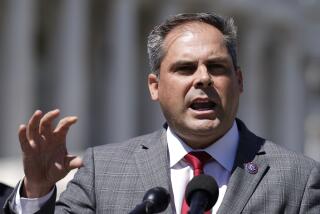Opinion: House budget proposal talks a bigger game than it plays
Describing its proposed budget resolution for fiscal 2016, the House Budget Committee declares, “This budget repeals Obamacare in its entirety -- including all of the tax increases, regulations, subsidies and mandates.” It adds that the resolution also repeals the more than $700 billion in Medicare reductions made by the healthcare law, along with the expansion in Medicare.
Only it does none of those things.
A budget resolution doesn’t have the force of law. It sets some broad spending limits that are hard for Congress to change, but it cannot, itself, alter any of the commitments Congress has already made.
The numbers in the budget reflect the policy choices and assumptions that the Budget Committee made, which is why the resolutions are typically accompanied by statements like the one quoted above. As a result, the committee’s annual budget proposal serves as the clearest statement of priorities the House majority will make all year.
Yet turning those policy statements into reality requires legislation that passes both houses of Congress and is signed by the president. Republicans may try to take a shortcut to President Obama’s desk by using the budget reconciliation process, which does not permit filibusters. But at the end of the line, they’d still face a certain veto if they tried to repeal any of the laws that the resolution claimed to be repealing.
So why claim that a budget will do something it manifestly won’t?
One reason is to illustrate the trade-offs that have to be made in order to achieve a balanced budget in 10 years, which the GOP has embraced as one of its key goals. Another is to put lawmakers on the record in favor (or against, in the Democrats’ case) policies on the GOP’s wish list, such as repealing Obamacare.
In that sense, it’s as much a campaign flier as a governing document. In fact, one of the most important decisions in this year’s budget resolution -- how much to spend in total -- has already been made. The 2011 Budget Control Act set the overall cap, along with separate totals for defense and domestic programs.
But don’t discount how important the budget can be as a political statement. Look for Republicans to tout their vote to bring the budget into balance over 10 years, to repeal Obamacare and to roll back the reductions in Medicare spending, even though their budget resolution will achieve none of those ends.
And look for Democrats to flail Republicans for voting to slash social programs, turn Medicare into a voucher program and kick millions of the poor off Medicaid and food stamps, even though their budget resolution will do no such things.
They get away with that sort of hyperbole because many voters don’t understand what a budget resolution can and can’t do. But you know better.
Follow Healey’s intermittent Twitter feed: @jcahealey
More to Read
A cure for the common opinion
Get thought-provoking perspectives with our weekly newsletter.
You may occasionally receive promotional content from the Los Angeles Times.











